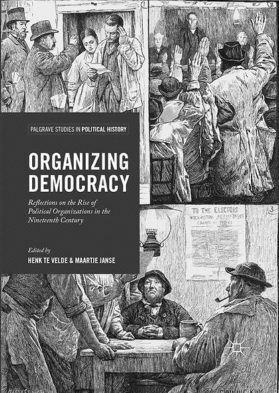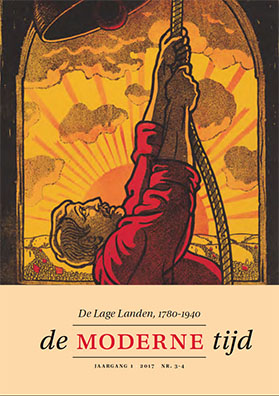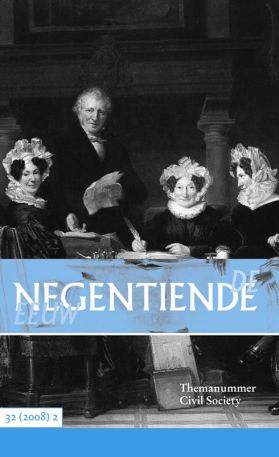Basingstoke: Palgrave Macmillan, 2017. 295 p.
ISBN 978 3 319 50019 5
€108,99
De artikelenbundel Organizing Democracy is het product van een driedaagse conferentie gehouden in 2014. Deze was onderdeel van het door Henk te Velde en Maartje Janse geleide NWO-onderzoeksproject The Promise of Organization. De bundel beoogt een geschiedenis te geven van negentiende-eeuwse politieke organisatievormen die niet enkel politieke partijen, maar ook volksvergaderingen, pressiegroepen en clubs omvat. De geschiedenis van politieke organisaties is immers niet die van de lineaire ontwikkeling van de politieke partij – ook al heeft oudere historiografie dit vaak gelijkgesteld – maar één van experiment en innovatie met velerlei organisatievormen. Dit experiment was vaak omstreden en de uitkomst was ongewis, maar de deelnemers eraan wilden – zo stellen Janse en Te Velde in de inleiding – allen ‘de democratie organiseren’. Organizing Democracy is een verzameling case studies uit verschillende landen hiernaar, waarbij niet de mogelijke verschillen tussen nationale trajecten, maar juist de overeenkomende ervaringen van negentiende-eeuwse organisatoren in de Verenigde Staten en West-Europa centraal staan.
De inleiding onderscheidt drie organisatietypes – de volksvergadering, de single-issue pressiegroep en de politieke partij – die voor tijdgenoten echter niet zo netjes onderscheiden waren. Gita Deneckere en Geerten Waling tonen in hun bijdrages hoe zowel Vlaamse arbeiders en middenklasse-radicalen in de jaren 1830, als Parijse en Berlijnse revolutionairen in 1848 experimenteerden met hybride vormen van volksvergaderingen, demonstraties en clubs. Reeve Huston beschrijft in een fascinerend artikel de openbare volksvergaderingen die in de VS in de jaren 1816-1828 gehouden werden over tal van economische beleidsonderwerpen. Dat petitioneren een zelfstandig politiek actiemiddel was dat in Groot-Brittannië in de vroege negentiende eeuw massale en georganiseerde vorm aannam, laat Henry Miller zien. Janse toont hoe succesvolle negentiende-eeuwse combinaties van deze actie- en organisatievormen als de Irish Catholic Association in de perceptie van tijdgenoten als ‘machine’ opereerden.
De tweede helft van de bundel is toch vooral aan de politieke partij gewijd. Nicolas Rousselier betoogt in een bijdrage die ietwat als overzichtsartikel aandoet waarom politieke partijen in Frankrijk minder voet aan de grond kregen dan elders. De Duitse liberaal-nationalistische Nationalverein was een hybride van pressiegroep en lokale civil society-organisaties die volgens Andreas Biefang in de jaren 1860 trekken van een politieke partij kreeg. Anne Heyer vergelijkt retoriek en praktijk van ledenparticipatie van de Britse National Liberal Federation en de Duitse Sozialdemokratische Arbeiterpartei, beiden de eerste massapartijen in hun land. Robert Allen verricht een interessante studie op microniveau naar de radicale netwerken en organisatoren die in New York in de jaren 1880 juist náást de twee grote politieke partijen opereerden. Hanneke Hoekstra levert de enige bijdrage die primair over de rol van vrouwen in het negentiende-eeuwse politieke bedrijf gaat, met een artikel over de political hostess (de organisatrice van politieke diners en salons) in Groot-Brittannië. Te Velde sluit af met een ideeënhistorische analyse van de invloedrijke studies naar politieke massapartijen rond 1900 van onder meer Mosei Ostrogorski en Max Weber.
De transnationale opzet van de bundel, waarin ervaringen in de Verenigde Staten, Groot-Brittannië en continentaal West-Europa meegenomen worden, is sterk. Dat geldt ook voor de lange termijn die de bundel bestrijkt, en de nadruk op de veelvormigheid van politieke organisatie. Een bundelconclusie mist echter. Dat is jammer, want het was interessant geweest te lezen welke casusoverstijgende conclusies de auteurs trekken uit de door hen geconstateerde overeenkomende ervaringen. En ook al is het niet de insteek van de bundel, ook een reflectie op mogelijke verschillen was interessant geweest. Tegelijk lijkt – ondanks de bedoeling van de bundel te breken met een lineair vooruitgangsperspectief – de overeenkomende ervaring van participanten veelal die van ontdekking, participatie en democratisch agentschap te zijn. Dat sommige politieke en maatschappelijke organisaties in de negentiende eeuw ook een remmend effect op democratisering en politisering gehad zouden kunnen hebben (denk aan monarchistische politieke clubs, elitaire kiesverenigingen, en herensociëteiten zoals onder meer bestudeerd door Jan Hein Furnée) blijft zo buiten beeld.
De keuze voor de negentiende eeuw is tenslotte helder – dit was de eeuw waarin politieke organisaties een schaalvergroting ondergingen, langzaamaan geaccepteerd raakten en uiteindelijk als onderdeel van het politieke domein werden geconceptualiseerd – maar toch wordt de (revolutionaire) late achttiende eeuw door haar enkel terugblikkend te behandelen mijns inziens wat tekortgedaan. Juist Britse radicalen, Amerikaanse en Franse revolutionairen, en Nederlandse Patriotten en Bataven experimenteerden met combinaties van volksvergaderingen, petitionnementsacties en politieke clubs, waar in de negentiende eeuw op voortgebouwd kon worden. Organizing Democracy is desalniettemin een belangrijke en veelzijdige bijdrage aan de studie naar politieke organisaties in de negentiende eeuw, die terecht benadrukt dat de ontwikkeling hiervan zoveel meer omvatte dan het streven naar politieke partijvorming.



